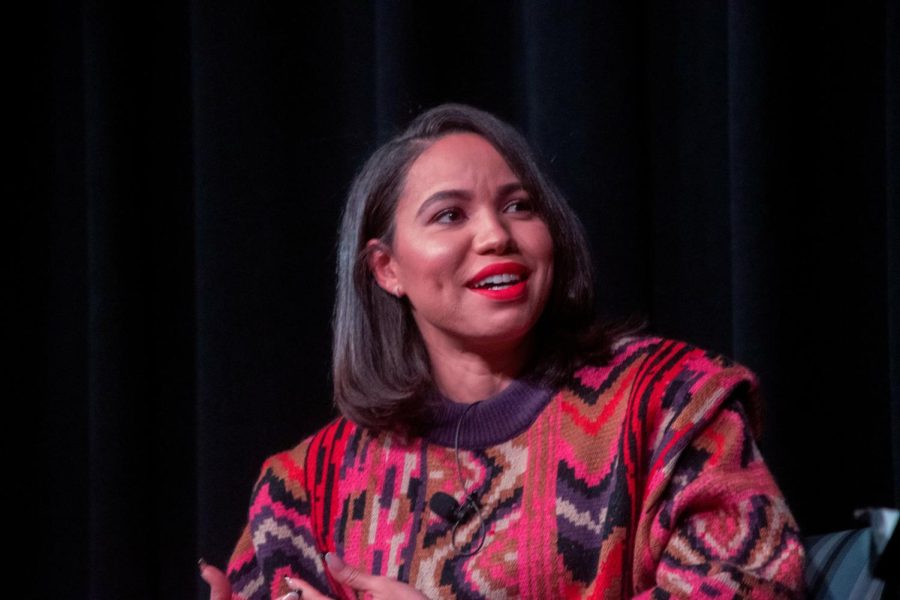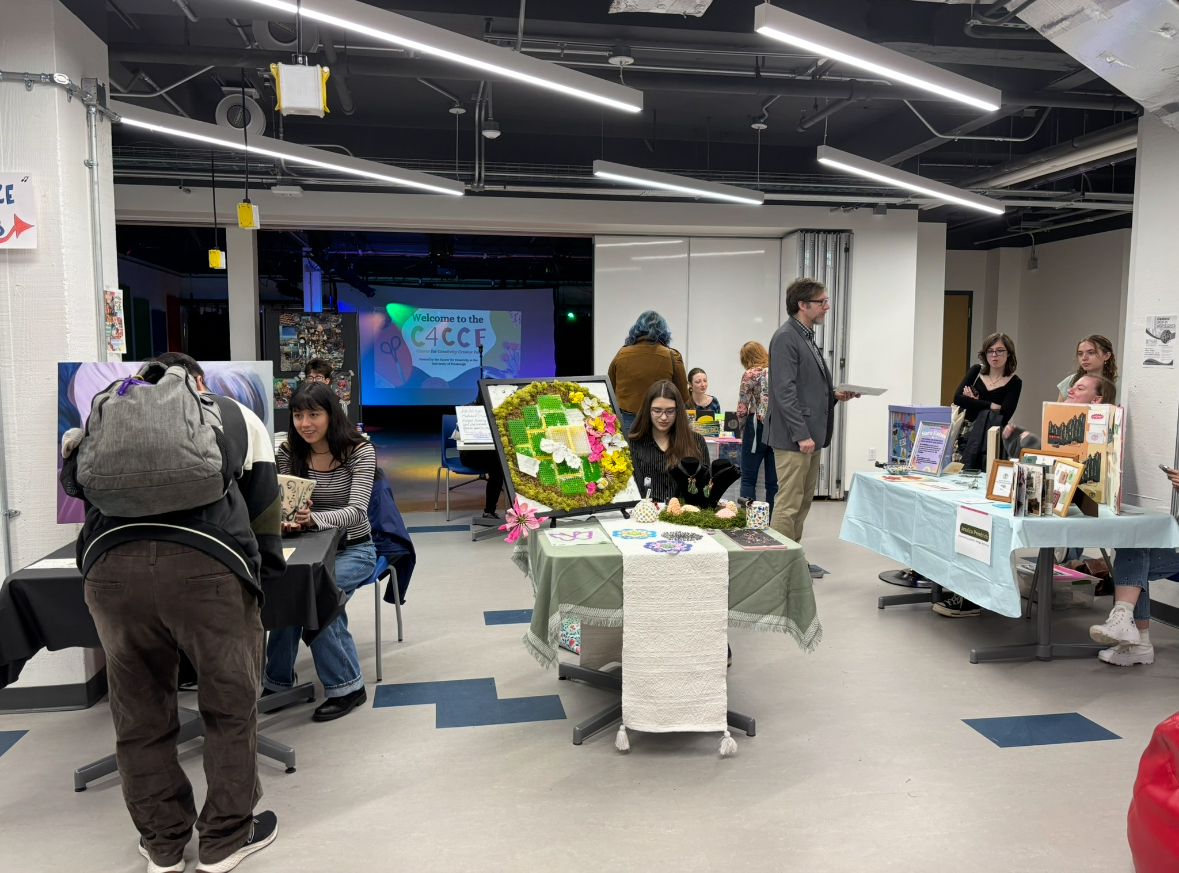‘Good representation is essential’: Jurnee Smollett talks Black voices at PPC event
Amaya Lobato | For the Pitt News
Actress Jurnee Smollett speaks to a crowd of Pitt students at “An Evening with Jurnee Smollett” hosted by the Black Action Society and Pitt Program Council at the William Pitt Union Wednesday night.
February 4, 2022
Jurnee Smollett began her acting career at just 10 months old. Her parents were performers and artists, raising their children in the acting industry. Smollett said the industry influenced her from the very beginning, and while those influences were both good and bad, she was empowered to choose her own path.
“I had this village of artists around me who are also activists and I understood I didn’t want to start using things to numb myself, I want to use my art,” Smollett said. “That was a real choice I was able to make at a very young age.”
In partnership with the Black Action Society, the Pitt Program Council (PPC) hosted “An Evening with Jurnee Smollett” at the William Pitt Union Wednesday night. As Black History Month commences, the 45-minute conversation and 15-minute Q&A with Smollett and moderators Destiny Mann and Annabeth Collis focused on Black history as well as Smollett’s role as an activist.
Smollett has starred in several award-winning films and TV shows, including “Full House,” “Birds of Prey” and most recently, a lead role in HBO Max’s series “Lovecraft Country.” “Lovecraft Country” is a science fiction show that features a predominantly Black cast, and Smollett said her character, Leti, gave as much to her as she gave to Leti.
“There was so much that I gave to her as myself and so much that she gave back to me,” Smollet said. “Through her I absolutely gained a courage and a level of awareness where I stopped apologizing for who I was.”
Smollett said she recognizes the responsibility she has as a Black artist to reclaim these Black narratives.
“I think that for too long, the erasure of the black bodies, black narratives, black stories — it has plagued mainstream media,” Smollett said. “They have tried to erase our story and rewrite our history, and I’m very aware of the responsibility we as artists have to take that back.”
Ashley Saunders, a senior psychology major, was one of the in-person audience members at the event. She watched “Lovecraft Country” with a Black friend, and said it taught her so much.
“It’s not often that white people are put in these positions of watching media that doesn’t have white narratives, and that’s the problem.” Saunders said. “Shows like ‘Lovecraft Country’ give us that chance to listen, to watch and to really pay attention to these voices and stories we aren’t exposed to.”
Smollett said Black representation in media is important, particularly when Black actors are put in major roles.
“Inclusion and good representation is essential,” Smollett said. “I think that’s why I’m drawn to certain projects, exploring themes of white supremacy or the patriarchy, to get that representation out there.”
Nick Jones, PPC’s public relations director, said when they partnered with BAS, Smollett was one of the people they really wanted to visit campus.
“She was a name everyone agreed upon, and we’re all genuinely excited for the opportunity to have a discussion with her about her career and activism,” Jones said.
Jones said this event is the start of Pitt’s celebration and focus on Black narratives and histories during Black History Month.
“We wanted to bring someone representative of Black culture as part of this celebration,” Jones said.
Smollett has been a long-time activist for civil rights, using her platform to raise awareness about HIV/AIDs, fight injustice and racism and use her roles to represent Black voices. At 11 years old, she even served as the youngest board member for Artists for a New South Africa, an organization that supports human rights and the arts across the continent.
“Sometimes it’s hard to separate the activist in me from the artist,” Smollett said. “Part of what we experience in this world is the fear of the unknown because they don’t know us unless they work with us or go to school with us.”
Today her activism focuses on the Black Lives Matter movement and fighting for Asian American justice. Smollett said Black History Month isn’t enough to highlight Black voices, and she strives to educate and create awareness through the characters she plays.
“Black history is American history, and we’re at a point where it’s not enough, we’re not talking about these veterans of civil activism,” Smollett said. “I think we are all so hungry to integrate our history and acknowledge the fact that America would not be here without the labor, the sacrifice, the genius — the magic of Black folk.”
Saunders said she’s inspired by Smollett’s ability to call out the weaknesses and underrepresentation of Black identities.
“Pitt isn’t doing enough to celebrate and protect our Black friends, and we as a whole race aren’t doing nearly enough,” Saunders said. “I admire how she calls people out for not doing enough, it forces us to take a real look at what we’re doing and ask ourselves if it’s performative or legitimately making a change.”
While Smollett acknowledged the power of Black History Month, she said a lot of it comes off as performative. To really make a change, according to Smollett, people need to be uncomfortable, and Black people need to challenge and disrupt the world around them.
“I am not a fan of performative activism or the symbolic stuff or the holidays,” Smollett said.
“It’s our duty to expand and disrupt and challenge and ignite, that is the duty of the artist is to make us uncomfortable, to create those conversations we often don’t have the courage to have.”



